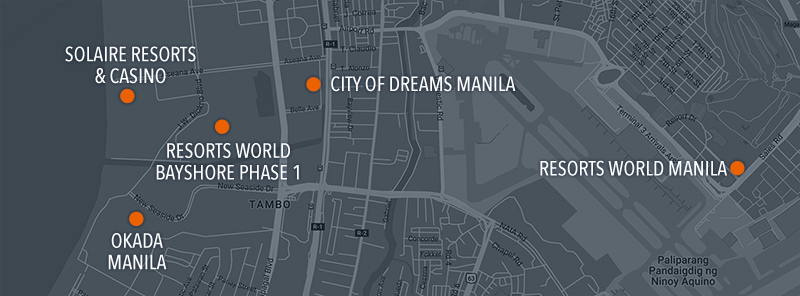Philippine Casino News

Philippine Casino News Today
Philippine high rollers will soon be able to gamble remotely with some of the country’s casino resorts as part of the Philippines’ efforts to offset at least a portion of the revenue losses caused by the closure of land-based gambling venues due to the coronavirus pandemic. MANILA - Philippine integrated resort and casino Okada Manila will retrench more than 1,000 employees next month, citing severe losses triggered by the ongoing coronavirus lockdown.
- At the request of a member of the Philippines Parliamentary House Committee on Games and Amusement a resolution has been filed urging competent authorities to look into integrated casino resorts in the country and establish whether these facilities have been compliant with tax laws.
- The Cebu casino could track the 20% annual growth in Manila’s gaming revenue in the past decade, Sueiro said, which was driven by the opening of four integrated casino resorts. Casinos are “resilient” and it’s not a gamble to say the market will bounce back from the pandemic. “The market is there. It’s a sure thing,” Sueiro said.


The Philippines today back plans from its national regulator to allow for the construction and establishment of new casino resorts across the country. The news comes off the back of a stagnant period in Philippines casino politics. After several years of obstruction to commercial casino interest, the countries national regulator lifted a ban. The idea is to allow for casinos to spread around the country and not just be concentrated in the small region of Clark.
There is a large casino industry emerging in Manila as local regulators seek to diversify the balance away from foreign investors. ©DaGreen92/Pixabay
Digital portal of the STAR Group of Publications: Delivers the latest news and views, multimedia, analyses and in-depth reports on the Philippines, sports, business, entertainment, lifestyle.
The news is being welcomed with open arms by the country’s largest operators. They have been restricted in this country for many years, and since the establishment of economic zones granting tax breaks to commercial interests around the Philippines – a unified and well-funded casino resort project always seemed a possibility that was on the horizon. Now the wheels are in motion, lawmakers have passed a series of proposals at the end of November 2019 making this latest construction project possible, seed funding has been secured and plans are being drawn to transform the casino landscape of the Philippines.
The special economic zone of Clark and Luzon Island already has a project underway. The new steps taken by the national casino regulator will grant licenses to a whole host of casino interests from around the world. It should be noted, that these licenses are indeed a special case, the resorts in question are “special projects” that fall outside the remit of the usual government policy toward commercial gambling entities. This latest action is merely an exceptional case to rejuvenizes a fledgling economic zone within the country.
Philippines Tightly Controls Its Casino Industry
It is well known that the Philippines President Duterte has a hardline approach to many typically enjoyed commodities and activities. In 2018 he pledged to not permit any more casinos or integrated resorts in the Philippines. What we are witnessing now is a backtrack on this policy. In the face of market and economic opportunity, Duterte has listened to calls within his own government to reconsider the aggressive anti-gambling stance.
A longtime spokeswoman for the ongoing status of gambling within the Philippines is the head of the national regulatory agency. The organization that has been tasked with carrying out the whim of their President, they are often caught in a conflict of interest. Speaking at the G2E Asia event to a crowd of industry leaders, the chairman and chief executive of the Philippine Casino regulator confirmed in her keynote address:
“We do not want to overburden the industry by just blatantly giving out licenses. The President declared a ban on IRs and casinos in January 2018 and we have observed that. We have to have critical mass in different parts of the country. We are improving our transport systems, we are improving our airports and our seaports. Where will all these people go, if we do not give them the services or the amusements or the entertainment or the gaming that they would like?”– Andrea Domingo, Chairman & Chief Executive, Philippine Gaming Regulator
This conservative system and approach toward the question of gambling regulation is typical of this region. Although Manila, the capital of the Philippines has for a long time been an adequate hub for gambling in Asia, it has recently been outstripped by the noisy neighbors in Macau and more recently the opened up markets of Japan. The main concentration of casinos in the Philippines is around the Cebu, Clark, and Manila city zones. The intention of the President and the Philippine Gaming Regulator is to ensure that the market of casinos is adequately diversified and there is not overcrowding in certain parts of the country.

Philippine Off-Shore Gaming Operators and Taxes
Philippine Casino News
Another topic that was high on the agenda at the G2E Asia convention last week was the issue of foreign casino interests evading taxes. The Philippine off-shore gaming operators, or POGOs as they are commonly referred, have in the past received a number of tax breaks from the government. To ambition back then was to encourage further investment into the country and bring about an invigorated tourism industry that would thrive under the lights of world-class casinos.

Philippine Casino News
However, for many, that dream did not become a reality. There have been a series of allegations of financial fraud, tax evasion on earnings and irregularities over the treatment and handling of employee contracts. As Andrea Domingo stated, “as far as POGOs are concerned, we have also stopped acceptance of new applicants”. This shift away from POGOs and an emergence of a new homegrown commercialized casino industry will certainly pay dividends for the Philippine government.
In the future, we can only expect to see further emphasis on this strategy. It is common for governments that run with a conservative agenda – eliminate the need for regulation in the market, by building the market framework that will regulate itself. The Philippines is poised to launch its new integrated resort project on Luzon Island. Whilst it avoids the problem of reaching “critical mass” in certain regions across the country, it has adopted a smart diversification strategy for the future of its casino industry.